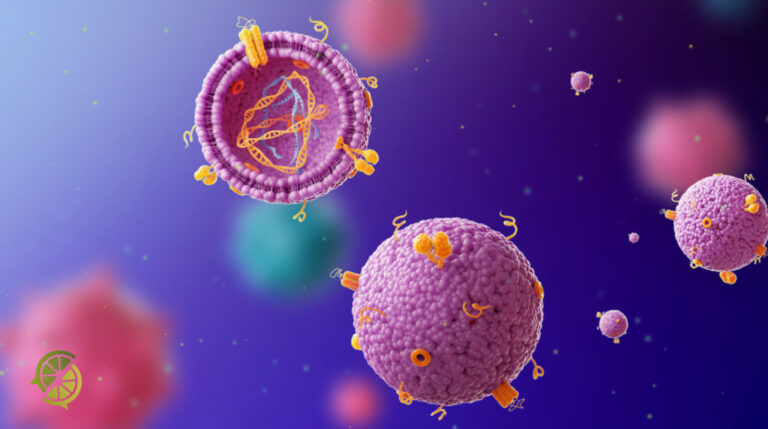
Whilst exosomes were discovered as early as 1983 it is only recently that their use in regenerative medicine has intensified and taken meaning. Exosomes are currently being tested as a way to deliver more effective treatments in some of the most difficult medical conditions such as cancer.
Exosomes are nanometer-sized vesicles that are released by cells into the extracellular environment. They contain proteins, lipids, and genetic material such as mRNA and microRNA that can be used to transfer information between cells. Exosomes have been found to play a role in various physiological processes, including cell-to-cell communication, immune regulation, and tissue repair. In recent years, exosomes have gained attention for their potential use in regenerative medicine.
Definition and Function of Exosomes
Exosomes are small membrane-bound vesicles (extracellular membrane vesicles) that are released from cells into the extracellular environment. They contain proteins, lipids, and genetic material such as mRNA and microRNA that can be used to transfer information between cells. Exosomes are involved in various physiological processes including cell-to-cell communication, immune regulation, tissue repair, and disease progression.
How Exosomes Carry Therapeutic Agents
Exosomes can be loaded with therapeutic agents such as drugs or genes which can then be delivered directly to target cells or tissues. This makes them an attractive option for drug delivery because they can carry large amounts of cargo while avoiding the body’s natural defences against foreign substances. Additionally, exosome therapies have been shown to be more effective than other forms of drug delivery because they can target specific areas of the body without affecting other areas.
Significance in Regenerative Medicine
Exosome therapy has been studied extensively for its potential use in regenerative medicine due to its ability to deliver therapeutic agents directly to target cells or tissues without affecting other areas of the body. It shows particular promise in the treatment of chronic inflammation, pain from autoimmune disorders or fibromyalgia, degenerative diseases, cancer therapy, neurological disorders, cardiovascular disease, and Lyme disease.
Additionally, exosome therapy is a highly targeted and flexible treatment for conditions like osteoarthritis and musculoskeletal injuries. While there is still much research needed before exosome therapy becomes widely available as a medical treatment option for patients across different healthcare fields it holds great potential for many diseases where conventional treatments have failed or caused significant side effects.
Ongoing Clinical Trials & Promising Results
There are currently numerous clinical trials underway exploring the potential benefits of using exosome therapies for a variety of health conditions including cancer therapy (such as breast cancer), neurological disorders (such as Alzheimer’s disease), cardiovascular disease (such as heart failure), autoimmune disorders (such as rheumatoid arthritis), and Lyme disease (such as chronic fatigue syndrome).
Early results from these studies have shown promising results with some showing improved outcomes compared to traditional treatments such as chemotherapy or radiation therapy. Additionally, some studies have reported fewer side effects when using exosome therapies compared to traditional treatments which could make them an attractive option for patients who may not respond well to conventional treatments or who experience significant side effects from them.
In Europe, Italian manufacturer DermoAroma has already completed successful trials and is working together with universities in exploring further health benefits that exosomes can offer. DermoAroma is the first company in Europe to safely use animal-derived exosomes.
Limitations & Challenges Associated With Exosome Therapy
While there is still much research needed before exosome therapies become widely available there are several challenges associated with their use including cost effectiveness compared to traditional treatments. Other concerns include:
- Lack of long-term testing
- Controlling their distribution within the body
- Difficulty targeting specific cell types
- Delivering large amounts of therapeutic agents
- Difficulty controlling their release rate
- Controlling their stability
- Risk of immunogenicity due to their origin from living organisms
- Risk of toxicity due to impurities introduced during the manufacturing process
- Risk of contamination due to improper handling during manufacture
- Risk of adverse reactions due to interactions with other drugs/medicines/treatments being taken by the patient at the same time
- Risk of misdiagnosis due to lack of standardization among tests used by different laboratories/clinics/hospitals etc.
- Lack of regulatory oversight over the manufacturing process
The Future of Medicine?
Exosomes are not a new form of medicine. They are a way to deliver existing medicine more effectively to the body. Exosome therapy holds great potential for many diseases where conventional treatments have failed or caused significant side effects but further research is needed before they become widely available as a medical treatment option for patients across different healthcare fields. It is important that readers understand both the potential benefits and challenges associated with exosome-based therapies so they can make informed decisions about whether this type of treatment is right for them based on their individual needs and circumstances.



Thanks for helpful information blogs,Santhathi with best and well advanced equipment’s treats the patients who visit us. Our clinic is well maintained and very spacious and one can feel a comfort zone wherein they can share their problems with regard to fertility and gynecologic issue. We do have advanced treatments for each issues. Get the most affordable Infertility Treatment in Bangalore, we at Santhathi offer Low Cost Fertility Treatment in Nagarbhavi. Book a Free Consultation now with our Infertility specialist. For more info visit our official website https://www.santhathiivfcentre.com/ or contact us @ +91 94815 38470, +91 80 23393557